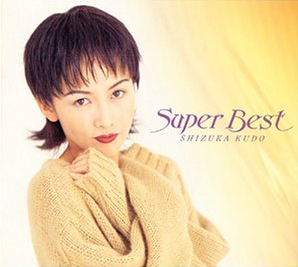
Super Best is the sixth compilation album by Japanese singer Shizuka Kudo. It was released on November 19, 1993, through Pony Canyon. It is Kudo's first single collection, featuring all A-sides produced by Tsugutoshi Gotō and released by Kudo since her solo debut, from "Kindan no Telepathy" up to the most recent at the time, "Anata Shika Inai Desho", spread out on two discs. The compilation also includes one new song, entitled "Honō no Naka e", which was written specifically for the album and which marks the last collaboration with Gotō until 2015, when he composed "Tan Jun Ai vs Hontō no Ai" for the compilation My Treasure Best: Miyuki Nakajima × Tsugutoshi Gotō Collection. Super Best was re-released in APO-CD format on December 1, 1993.
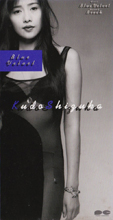
"Blue Velvet" is a song recorded by Japanese singer Shizuka Kudo for her thirteenth studio album, I'm Not. It was released by Pony Canyon as the album's leading single on May 28, 1997. It served as the third ending theme song to the Fuji Television anime series Dragon Ball GT, from episode 42 to episode 50. Out of all the artists that have contributed to the series' soundtracks, Kudo is the only one who is unaffiliated with a Being Inc. label. Kudo, who is a self-proclaimed Dragon Ball fan, received an autographed hand-drawn illustration of Goku from series creator Akira Toriyama for her 28th birthday.

Rosette is the fifth studio album by Japanese singer Shizuka Kudo. It was released on April 4, 1990, through Pony Canyon. Initially titled Mysterious II, Rosette is Kudo's first album to be entirely arranged by Tsugutoshi Gotō and his band members, credited under the name Draw4. The limited first pressing of the album came in a special box packaging. Rosette was re-released in APO-CD format on December 1, 1993.

"Kōsa ni Fukarete" is a song recorded by Japanese singer Shizuka Kudo, released as a single through Pony Canyon on September 6, 1989. It is Kudo's last single to be released in 7-inch vinyl format. The song, which has never appeared on an original album, was included in the compilation album, Harvest. It was featured on commercials for Taiyo Yuden That's cassette tapes.

"Please" is a song recorded by Japanese singer Shizuka Kudo. It was originally intended to be included on Kudo's sixth studio album, Mind Universe, but was dropped at the last minute. The song was released as a single by Pony Canyon shortly thereafter on May 15, 1991. It made its first album appearance on the compilation album Intimate.

"Ice Rain" is a song recorded by Japanese singer Shizuka Kudo for her tenth studio album, Purple. It was released through Pony Canyon as the album's lead single on November 18, 1994, merely two months following the release of her ninth studio album, Expose. The single was released simultaneously with Kudo's third video album, Female III. An English version of the song was recorded for the compilation album, Best of Ballade: Current (1998). In 2015, DAM asked their users to select their favorite Shizuka Kudo songs to sing karaoke to and compiled a top ten list; "Ice Rain" came in at number three and was the only song penned by Kudo to make the top ten.

"Kirara" is a song recorded by Japanese singer Shizuka Kudo. It was released as a single by Pony Canyon on July 17, 1998. Both "Kirara" and its coupling song, "In the Sky", were prominently featured on the CX television series, Kamisama, Mō Sukoshi Dake. Kudo performed the song on the 49th Kōhaku Uta Gassen, accompanied by Taro Hakase on the violin, marking her eighth and last appearance on the show. "Kirara" made its first album appearance on the compilation album, Best of Ballade: Current, for which Kudo also recorded an English version of "In the Sky".

Best of Ballade: Empathy is the fifth compilation album by Japanese singer Shizuka Kudo. It was released on November 20, 1992, through Pony Canyon. It is Kudo's first ballad collection, followed by Best of Ballade: Current in 1998. Half of the album is made up of ballads from previously released studio albums while the other half features new songs recorded for the album as well as unreleased ballads co-written by Kudo, under the pseudonym Aeri.

Purple is the tenth studio album by Japanese singer Shizuka Kudo. It was released on August 2, 1995, through Pony Canyon. The album is named after Kudo's favorite color, purple, or more specifically wisteria. The record features the song "Olivia", which Kudo wrote about her deceased brother.

She: Best of Best is the seventh compilation album by Japanese singer Shizuka Kudo. It was released on December 16, 1996, through Pony Canyon. The first disc includes songs from Kudo's Tsugutoshi Gotō-produced era albums, while the second disc features songs from Kudo's self-produced records. Disc 2 contains a new song written specifically for the album, entitled "Hot Winter".
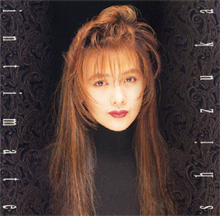
Intimate is the fourth compilation album by Japanese singer Shizuka Kudo. It was released on December 11, 1991, through Pony Canyon. The album features all singles released from "Koi Hitoyo" (1988) through "Metamorphose" (1991). The opening track, "Dare mo Shiranai Blue Angel" is a re-worked solo recording of an Ushirogami Hikaretai song by the same name released as a B-side to the single "Hora ne, Haru ga Kita" in 1988. The closing track is a new song entitled "Rashikunai", written specifically for the album by Kudo herself, under the pseudonym Aeri.

Expose is the ninth studio album by Japanese singer Shizuka Kudo. It was released on September 7, 1994, through Pony Canyon. The album was recorded and mastered in Los Angeles. Expose is Kudo's first self-produced album. It yielded the two singles, "Blue Rose" and "Jaguar Line".

Rise Me is the eighth studio album by Japanese singer Shizuka Kudo. It was released on April 1, 1993, through Pony Canyon. Rise Me is Kudo's last album to be produced by Tsugutoshi Gotō. It yielded Kudo's best-selling single, "Dōkoku".
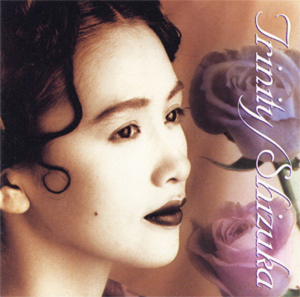
Trinity is the seventh studio album by Japanese singer Shizuka Kudo. It was released on March 18, 1992, through Pony Canyon. Trinity is Kudo's last album to be produced by Tsugutoshi Gotō. It yielded Kudo the single, "Mechakucha ni Naite Shimaitai", which became one of Kudo's signature ballads. The album also includes one of Kudo's longest recorded songs, the album closer "Suterareta Neko Janai Kara", which runs for over seven minutes.

Mind Universe is the sixth studio album by Japanese singer Shizuka Kudo. It was released on March 6, 1991, through Pony Canyon. It features the single "Boya Boya Dekinai". The album was re-released in APO-CD format on December 1, 1993. Mind Universe became Kudo's fourth number-one album and her last record to top the Oricon Albums Chart.

Unlimited is the third compilation album by Japanese singer Shizuka Kudo. It was released on November 14, 1990, through Pony Canyon. The album features all original recordings of the singles released from "Koi Hitoyo" (1988) through "Watashi ni Tsuite" (1990), as well as reworked versions with new vocal takes of Kudo's first batch of singles, from "Kindan no Telepathy" through "Mugon... Iroppoi". The album also includes a new song, entitled "Koi Moyō", co-written by Kudo herself, under the pseudonym Aeri, specifically for the album.

Harvest is the second compilation album by Japanese singer Shizuka Kudo. It was released on December 6, 1989, through Pony Canyon, merely two months after the release of the album Karelia. Harvest features the singles "Koi Hitoyo", "Arashi no Sugao" and "Kōsa ni Fukarete", their B-sides, a few select tracks from Kudo's three studio albums released at the time, Mysterious, Shizuka and Joy, as well as a new song recorded and co-written by Kudo for the album.

Gradation is the first compilation album by Japanese singer Shizuka Kudo. It was released on November 30, 1988, through Pony Canyon. The album includes all five singles released by Kudo at the time, from "Kindan no Telepathy" through "Mugon... Iroppoi", their coupling songs, as well as one new song, entitled "X'mas ga Ippai", recorded specifically for the compilation. Gradation was re-released in gold CD format on March 21, 1989.
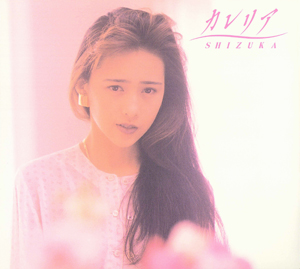
Karelia is the fourth studio album by Japanese singer Shizuka Kudo. It was released on October 4, 1989, through Pony Canyon. It is a concept album inspired by the music from Finnish Karelia. The album was entirely recorded in Finland and features the Helsinki Philharmonic Orchestra as well as a choir group from the University of Helsinki. Despite being composed and produced by Tsugutoshi Gotō, Karelia lacks any trace of the signature rock style of Gotō's other compositions. The record features lyrics penned by Taeko Onuki and also includes the first song written by Kudo herself, under the pseudonym Aeri. While in Finland, Kudo created oil paintings inspired by the people and landscapes, which were incorporated into the design of the album's packaging. Karelia was re-issued in APO-CD format on December 1, 1993.

Shizuka is the second studio album by Japanese singer Shizuka Kudo. It was released on July 21, 1988, through Pony Canyon. The eponymous record is often cited as an EP, despite being officially regarded as her second album. Shizuka is entirely written and composed by Miyuki Nakajima and Tsugutoshi Gotō, respectively. Nakajima recorded a cover of the fifth track, "Hadashi no Lion", for her album Otogibanashi: Fairy Ring (2002). Shizuka was re-issued in gold CD on March 21, 1989, and later in APO-CD format on December 1, 1993.




















